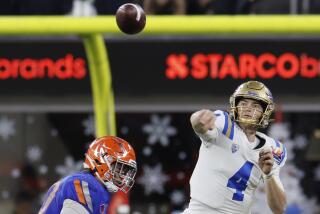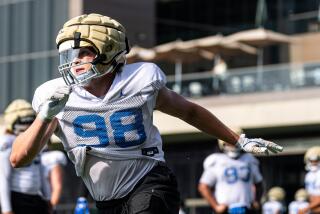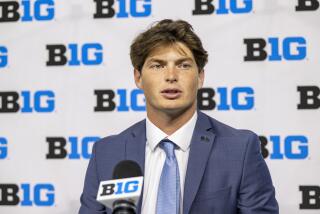Josh Rosen is among former UCLA athletes back hitting the books
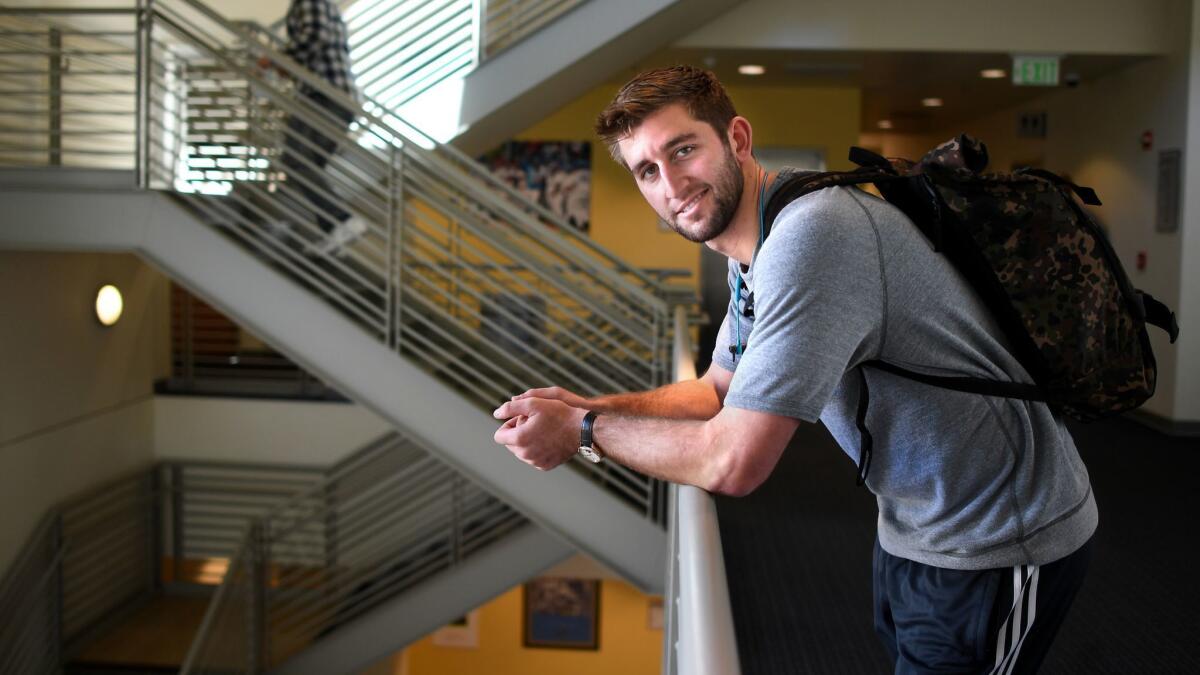
Football or school? School or football?
For three years, Josh Rosen felt like he was being torn between two great loves.
“You can’t put as much into one thing as you want,” Rosen said, “and I felt like I was shortchanging football a little bit by giving school so much time.”
That didn’t stop the quarterback from starring in both endeavors during his time at UCLA, becoming the school’s single-season passing leader in 2017 and a five-time member of the athletic director’s honor roll.
The division of labor is easier these days. Rosen has gone on to the NFL, recently completing his rookie season with the Arizona Cardinals, but he’s not neglecting that other love.
Rosen has fully devoted himself to his schoolwork after returning to UCLA in January to take three classes toward his undergraduate degree in economics. The plan is to take the balance of classes he needs next winter, allowing him to walk with several friends during graduation ceremonies in the spring of 2020.
It will be the end of one era just as Rosen continues the early stages of what he hopes is a lengthy professional football career.
“I just never in my life imagined not graduating college,” Rosen said, “so I feel like it’s kind of my obligation to my parents almost to give them a degree in return for everything they’ve given me.”
Rosen isn’t the only familiar face strolling campus this quarter. Marcedes Lewis, the John Mackey Award-winning tight end at UCLA who has spent 12 of his 13 NFL seasons with the Jacksonville Jaguars, is also back working toward his degree, a 34-year-old intermingling with classmates who might confuse him with one of their professors were he not 6 feet 6 and 267 pounds.
Both players have returned as part of the Bruin Varsity Club Degree Completion Program that helps the school’s former athletes come back to obtain their diplomas. Provided the athletes’ professional contract doesn’t include tuition reimbursement, UCLA foots the roughly $4,800 quarterly bill for tuition, books and fees (plus an additional $9,700 for those who live out of state) as well as housing costs for those who have not gone on to make millions in a pro league.
UCLA also provides tutorial support, academic counseling and access to its learning center, giving returning athletes the same services that the school’s current student-athletes receive.
Christina Rivera, the UCLA senior associate athletic director who oversees the program, said 51 athletes have returned to work toward their degrees since 2016. Their ranks include former NFL running back Paul Perkins, retired MLS star Kevin Hartman, Olympic water polo gold medalist Samantha Hill and professional golfer Bronte Law.
Scores of baseball players have come back, fulfilling coach John Savage’s recruiting edict that anyone who plays for him will eventually return to get his degree. Mattie Larson, a former U.S. champion in the floor exercise who says that she was one of the Larry Nassar abuse victims, returned to obtain her degree after her ordeal had forced her to abandon her studies.
The length of time it takes a returning athlete to complete his or her degree depends on more than the number of classes needed; it also hinges on availability amid a busy schedule. Most of Rosen’s time is consumed by his NFL season, organized team activities and training camp, leaving the 11-week winter quarter as the best option to squeeze in schoolwork.
“Quarters are short,” Rosen said, “so it’s not like I need to give a big off-season to it.”
Rosen has resumed student life beyond the classroom, sitting courtside at a few men’s basketball games and hanging out at the five-bedroom apartment he used to share with teammates Matt Lynch and Ethan Fernea, who will play for the Bruins next season. Rosen has his own short-term lease in an off-campus apartment, where he busies himself with his studies. He’s taking Econometrics, Monetary Policy and Money and Banking, learning about interest rates, the bond market and international exchange. He said he had forgotten how much effort was needed to do well in a class.
“It’s hard to study for a test and be like, ‘I only need a C or a B,’ ” Rosen said. “If you’re going to study your ass off and you’re going to try to get as high a score as you can, you usually will probably end up with a C or a B at a school like this, so there’s no, like, more or less incentive in these classes. I’m still studying as much as I did when I was here.”
Rosen’s presence has predictably generated a few stares from students wondering why a top-10 NFL draft pick is strolling Bruin Walk with a backpack slung over his shoulder, but there hasn’t been any discernible reaction among his professors.
“I don’t think any of my teachers know much about football,” Rosen said. “Pretty much every teacher I have is foreign, and UCLA’s a brilliant mix of minds from all over the world.”
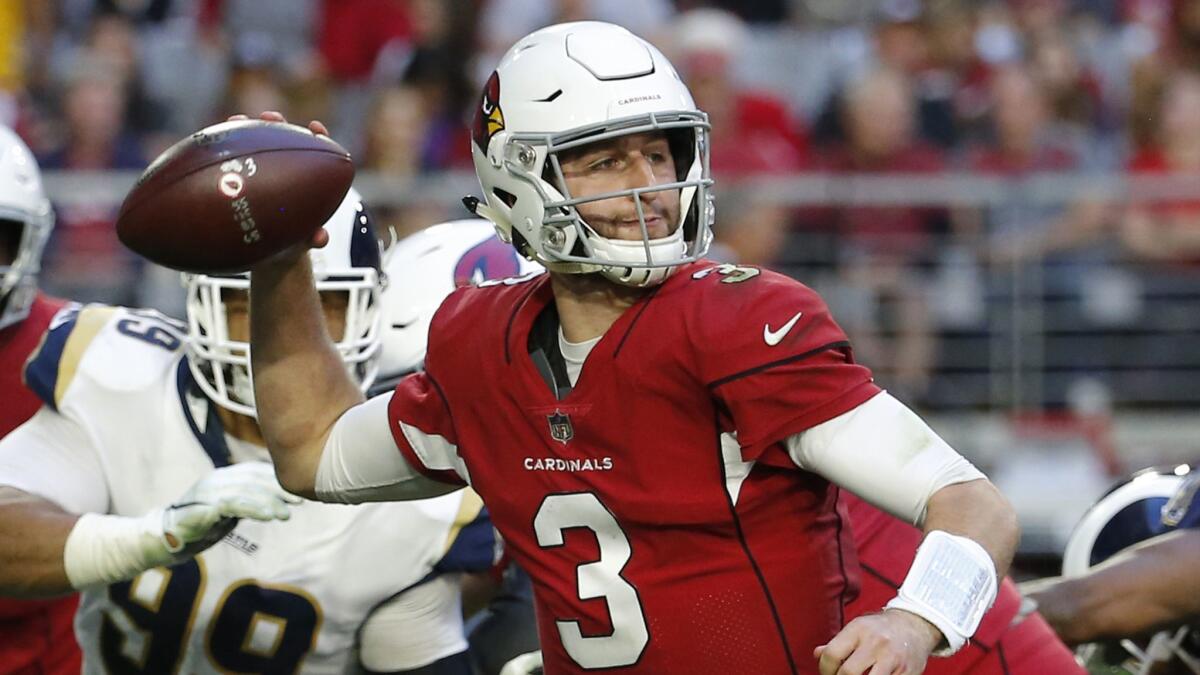
Come April, Rosen will head back to Phoenix to learn the offensive language of new Cardinals coach Kliff Kingsbury. He’s coming off a rookie season in which he took over as the starter in the season’s fourth game and completed 55.2% of his passes for 2,278 yards with 11 touchdowns and 14 interceptions.
The number that most irritated Rosen was the Cardinals’ 3-13 record. It made a player known for his outspokenness on social issues feel like not saying all that much.
“If you win three games and you have 16 opportunities,” Rosen said, “the last thing [fans] want to hear is about your opinions on like, I don’t know, climate change, stuff like that, so you’ve got to walk the line a little bit. The audience is bigger but you’ve just got to kind of know your time and place. Your primary job is to be a football player and you’ve got to accomplish that task before you go out and do anything else, really.”
Getting a UCLA degree might enhance Rosen’s chances of becoming the next Bruin whose name is synonymous with not only athletic greatness but also meaningful social change.
“I’m not going to even mention my own name in the breath of these guys,” Rosen said, “but you sort of go to this school in the shadows of some of the most famously politically active in history from Kareem Abdul-Jabbar to Bill Walton to Arthur Ashe, so it’s got some high standards to live up to, so hopefully one block at a time. But I just like learning new things, new people and for the rest of my life I want to travel and do all that, so this is just a cool opportunity to learn.”
More to Read
Go beyond the scoreboard
Get the latest on L.A.'s teams in the daily Sports Report newsletter.
You may occasionally receive promotional content from the Los Angeles Times.

